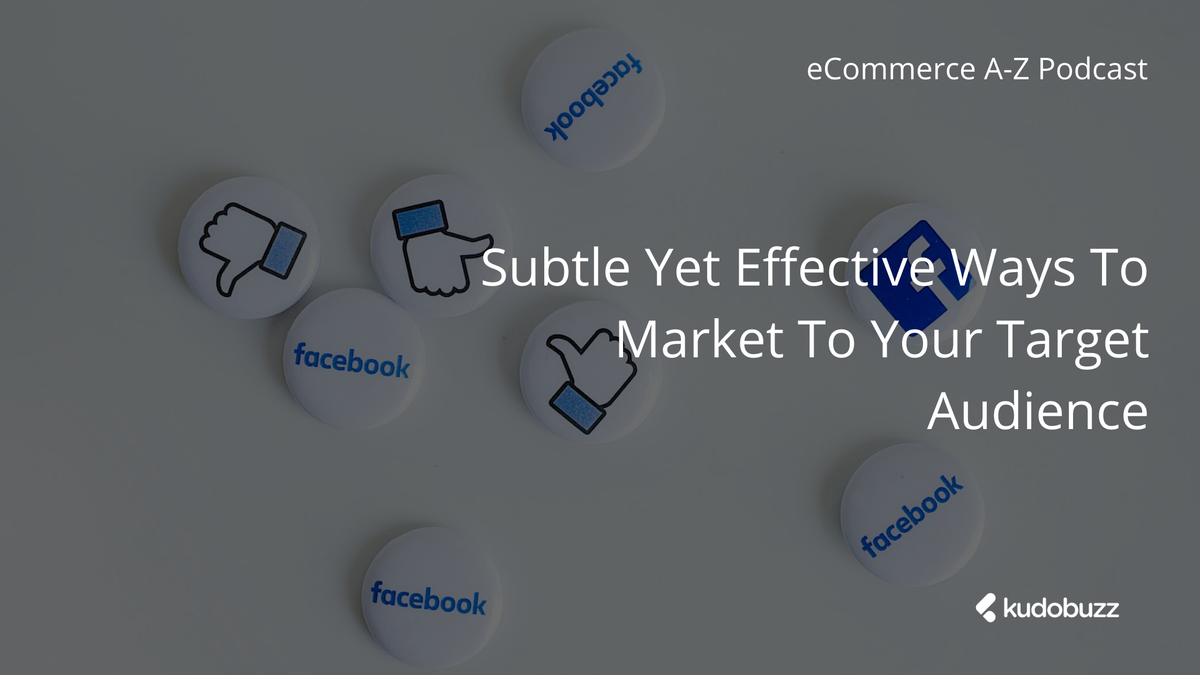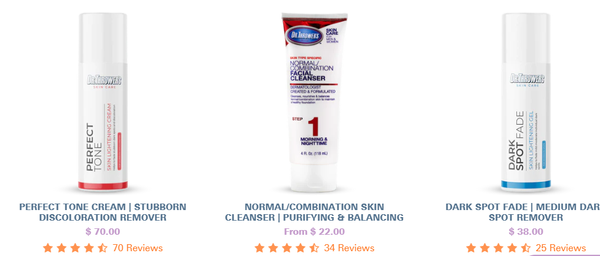Our guest for this episode is Luke Knight. Luke is the cofounder of Prospect Knight, an audience marketing agency in London. Their mission is to connect brands with their audience in creative and agile ways.
We speak on how to market to your target audience in a subtle yet effective way using different marketing campaigns at every stage of the customer acquisition funnel.
This is the eCommerce A-Z podcast and I am your host, Dzifa Mensah.
Introduction
For me it would be the once someone becomes a customer, you treat them like they are the most important person in the world because that is what will create loyalty, that is what will create referrals and recommendations, and them telling their friends and family about you.
Dzifa Mensah
Hi There, Welcome to the eCommerce A-Z podcast, where we teach you how to start and grow a thriving eCommerce business.
Our guest for this episode is Luke Knight. Luke is the co-founder of Prospect Knight, an audient marketing agency in London. Their mission is to connect brands with audiences in creative and agile ways.
In this conversation, we speak on how to market to your target audience in a subtle yet effective way, using different marketing campaigns at every stage of the customer acquisition funnel.
This is the eCommerce A to Z podcast, and I am your host Dzifa Mensah. Stay tuned.
Dzifa Mensah
Hi Luke
Luke Knight
Hi, how are you?
Dzifa Mensah
I’m fine. How are you too?
Luke Knight
Very well, thank you
Dzifa Mensah
Can you kindly tell me about yourself and about Prospect Knight?
Luke Knight
Yeah, definitely. So Prospect Knight, we are a marketing company. We were founded by me and my two brothers. So there is three of us, three of us that started the business. We’ve always worked in marketing and me and my younger brother Marcus, we have always worked in digital, and some sort of big agency background and my older brother Reece, always worked in print and direct mail and the physical side of marketing. We always wanted to start a business together. We are from a long line of family businesses. But we wanted to do something for ourselves and we wanted to do what we do best which is marketing. So we started Prospect Knight to ultimately focus on audiences. So we are very audience centric business and we believe that if businesses focus on their customers, it makes everything else easier. So if you understand who your customers are, not only can you go and find new customers that look like your existing customers, but you can also retain the customers that you have, and in turn maximize kind of life time value. So everything we do focuses on audiences, but really the channels that we are expressing are our focus. So we do CRM; customer relationship management, email marketing, SMS, direct mail, and we do online advertising which is PPC, social advertising, display, remarketing, and so forth. So we keep our skill set and our expertise very focused. Everything for us comes down to the audience. So we are based in London, and there are 11 of us in the business now, and currently talking to you from lockdown.
Dzifa Mensah
Alright. So what industries do you usually consult for?
Luke Knight
We usually, we do a lot of eCommerce. We do a lot of retail businesses, so that is everything from fashion to design. We do travel which is obviously eCommerce because people are booking travel, booking holidays and flights and so forth online. We do some sports retailers. So people that are selling running gear and cycling gear and so forth. But outside of eCommerce we do a lot of business to business marketing as well so tech companies whether it is financial tech services or property tech services. So really we have a wide range of data experience but eCommerce is definitely the heaviest part.
Dzifa Mensah
What is customer acquisition for eCommerce businesses?
Luke Knight
So customer acquisition is ultimately how you win new customers. It is really as simple as that. How the brands go out and find people that are potential customers and then what thing that they have to do to make them a customer.
Dzifa Mensah
So what’s that entire process like for a typical eCommerce business? Let’s talk about the whole customer acquisition funnel.
Luke Knight
If you take a typical funnel, people talk about awareness, consideration and conversion. So ultimately, every business, every eCommerce business, has to take people through that journey. There will be people out there that you understand to be your potential customers, or they are the right fit to buy your product but they don’t know you. So the first stage is obviously to make people that are unaware of your brand and your products, you need to make them aware. So there is a lot of tactics, we call sort of top of funnel, and social advertising for example is a fantastic place for that. If you are advertising on facebook or ticktock or Instagram, you can reach a really wide audience and you can raise awareness of your business. So once you obviously have raised awareness of your brand and generally, you kind of know that because someone has looked for your advert and they have visited your website, know they are aware of your business but they have not yet purchased. So then you move down to the next part of the funnel which is how do I make someone aware of my product, how do I make them want to buy it, and that’s where lots of channels lots of work go into. One making sure your website is excellent to make sure that when people are looking at your products, they are researching things, they are reading blogs, that you are doing everything you can to urge them along the process of buying. But then also tactics like PPC, where you can build on certain keywords, email marketing where you can sort of nurture people. So in that middle part of the funnel, you are doing everything you can to encourage and persuade the person to purchase. And obviously the final stage is the conversion which is when someone is ready to buy, how do you make it as easy as possible for them to purchase and that’s where obviously your website comes in into play and your checkout, your basket, all of that kind of final purchase funnel, making sure that is perfect. But again on the PPC front, if someone is ready to buy, if they search for your brand, you want to make sure you are there. So if it is from a PPC perspective or an organic SEO perspective, you want to make sure that you are there. So ultimately, when it comes to Acquiring customers, you need to take people through that funnel of awareness, consideration and conversion.
Dzifa Mensah
What type of campaigns can eCommerce merchants run at different stages of their business? So following the sales funnel we just spoke about when a business is just starting and at the awareness stage, what tyoe of campaign you think they should consider running?
Luke Knight
I think, really good question. If we take that at different stages and what activity people run. If we look to awareness, how can eCommerce businesses that are just starting out, what can they do to raise awareness? For us, the channel that works very well would be social media advertising. So running advertising campaigns on something like Facebook or Instagram is fantastic. But our recommendation will be at the awareness stage, it's about telling your story. So a lot of brands fall into the mistake of just purely talking about their product, buy this, buy this, buy this. Whereas actually at the awareness stage, it is very important to talk about who the business are. What you stand for? Why you are different? Why you are great? All of these sorts of things because at that stage of the person buying journey, that’s when it becomes really important to sell your story. So video advertising campaign stories on Facebook, and Instagram are a great way of telling your brand a story. In that kind of consideration stage, if I looked at the number one thing or the most key campaign for someone to run at the consideration stage, that would be remarketing. So remarketing is ultimately being able to show someone an advert that you know has been to your website before. For me, when you are trying to persuade someone to buy and to convert on your eCommerce website, remarketing is essential. So you can run remarketing on facebook, on Instagram and on something like google display network, so you can run your banner advertisement through that. You can even do remarketing through PPC. But in that middle funnel, absolutely remarketing is really key. Other campaigns people could run, I know we have already spoken about email marketing. There’s lots of nurturing campaigns that people could run from an email perspective that would allow people or encourage people to convert. There’s lots of different campaigns but definitely tell the story, tell the brand’s story, let people know who you are and why you are great, why you are amazing, and another key bait is remarketing. If someone has been to your website and they have engaged in a certain way, we want to try and reach that person again, if they haven’t converted.
Dzifa Mensah
What role does storytelling play and does your story have to be unique?
Luke Knight
I think the role that storytelling plays is ultimately, it builds the perception of your brand. Right now, any marketing is busy. There is a lot going on and it is a lot more difficult to grab people’s attention now than it was five years ago. The reason storytelling is important sort of important is it can make you stand out. So you don’t have to necessarily be the product you sell or the service you have doesn’t need to be different, to everything else in the market. I really think it is important to get your story, your brand, what you stand for, I think that is important to be different because that is what makes you stand out. If someone is buying a pair of trainers, and they are on Instagram and they see lots of different trainer businesses, the one that is going to catch their eye and they one that they are most likely to go and visit their website and purchase are the ones that have a really emotive story or they really know what they stand for or they have great customer service or they have very quick delivery times. There are lots of different USP’s businesses can have, and I think that the way that you share those messages through advertising, through email is really important. I think doing it that way will build more loyalty and will build more engagement to your brand than simply advertising that you can do a pair of trainers for 50 pounds. So I think the importance of storytelling is it brings the right people into the funnel.
Dzifa Mensah
People really complain a lot about retargeting ads, not merchants but the people who receive the retargeting ads. Sometimes it gets annoying. In what ways can people do retargeting ads without it seeming annoying to their audience?
Luke Knight
Great question. Advertising, remarketing when is done wrong can be really annoying so I completely understand that. One of the simple things to do, people think that they need to remarket to every single person that visited your website. That’s not correct. The best way to do it is to create what we call sort of engagement buckets and they remarket to those people. So rather than remarketing to anyone that visits your website, create an audience and you can do this through Google Analytics of people that spend three minutes on the website, they visited five pages, they looked at a product, and they visited the blog. If people tick all of those things, then we are going to remarket to them. Because me for example, I can visit a website by accident, I can go in and disappear. Yet, I would be remarketed to for six months. So it's about understanding the person’s behavior. Are they likely to be a customer? If they are likely to be a customer because of the way that they engaged with your website, then yes, remarket them. The length of time that you remarket to someone is really important and some people just have the exact same advert, remarketing the exact same audience for 12 months at a time. We wouldn’t recommend that. We recommend doing small bursts. So remarket to people for 2 to 3 weeks, if they haven’t converted at that point, then stop remarketing to them. Make sure you mix up the adverts, put different images, different videos, different words so that people see they are not seeing an ad over and over again. And I think the final key point of remarketing is to remove people that have purchased because the habit is that if you have Facebook remarketing running for example, even if I went and purchased a pair of trainers, the remarketing will still target me. It will still keep saying ‘look buy these trainers’, but I have already purchased them. What a business can do is have a remarketing list that they can remove anyone that has purchased in the last 20 days so that you are not annoying people by saying buy these trainers when they have already purchased them. So remarketing is a fantastic channel, but it needs to be done right and you need to take attention and care to make sure that you are really focusing on the right audiences and if you do that it is a really powerful channel.
Dzifa Mensah
It really doesn’t sound like when I follow all the things that you have spoken about it would be a bother anymore.
Luke Knight
Exactly, that’s the thing with all marketing. Any marketing can be annoying for the customer, for the consumer. If you do it right, if you have the time to really understand the audience, understand the messaging and the timing, marketing should always be visible. When it is not invisible, when you can really see it, that’s not great marketing. All marketing can be annoying if it is done wrong and that is the key bit. I think if you really pay attention to the audience, pay attention to what you are saying to them and when you are saying it, marketing should almost be invisible. It should fit in with everything else people see. When it is not, when it is abrupt, the timing is bad, when it is saying the wrong thing, that is when marketing can get a bad name.
Message from sponsor
The eCommerce A-Z podcast is brought to you by Kudobuzz Review. Over 70% of online shoppers refer to reviews before making a purchase, according to them reviews serve as social proof and aids them in making purchase decisions. Collect reviews and display them on your website to convert your visitors to buyers. Join over 25,000 online merchants in the Kudobuzz family and start boosting your sales now. Kudobuzz review app is available on Shopify, Bigcommerce, Wix, Weebly and Wordpress. Check out kudobuzz.com for more.
Dzifa Mensah
Let's talk about lifetime value. It's one of the things to pay attention to when you are reaching out to customers, when you are trying to acquire customers and when you are doing your entire marketing process. Why does it matter?
Luke Knight
It matters simply because for a business it is very expensive to acquire brand new customers, whereas to get your customers to purchase for a second time, third time or a fourth time is a lot cheaper. So on average, we see that it costs a tenth to get someone to purchase a second time than it does to acquire them. If for example I went on and acquired a new customer for my trainer business, and it cost me a 100 pounds, to get that person to buy for a second time, on average it costs me 10 pounds. So for a business, a lot of money can be made from making people purchase again and again and that’s where kind of the customer lifetime value is so important because you want to create that loyal customer base. You want people to come back time and time again to purchase your product because you have to do less marketing to those people. So while it is important to continually acquire new customers, you need to make sure that for every customer that comes in, you are doing every possible thing you can to make sure that they buy again and again and they become a customer forever. So really for us lifetime value and paying attention to the strategies you have for your customers is so important for bringing a real profitable business in the long term.
Dzifa Mensah
Okay so how can companies build loyalty with their customers to increase their lifetime value?
Luke Knight
So one of the key things is to obviously having great products. If you have great products and a great service, people will more likely purchase again and again. But businesses can’t rely on people just purely coming back and purchasing for the second time. Consumers and people need reminding. They need a nudge. So a lot or CRM activity really helps prove and build lifetime value. So email marketing campaigns to your customers, text messages, SMS, just texting someone or sending something to someone’s house in a direct mail piece, those sort of activities are a great way of reminding people why they purchased from you in the first place. So whether it is an email campaign that sends two months after someone purchases to say I really hope you are enjoying x, y and z and it is a really great way of keeping you front of mind, that’s what this is all about. Social media is a fantastic way. People purchase from you, they then follow you on social media, the content you share there, is again a great way of keeping people bonded to you. Remarketing, and every aspect of remarketing from an acquisition perspective but remarketing can also be used for a lifetime value. You can create a remarketing audience that is just of existing customers. So if it is Christmas for example, you can do a remarketing campaign to the people you know have purchased before and you can say, are you running low on this face cream or are your trainers dirty or do you need a new pair. So a lot of the same tactic that you use to acquire customers, those same tactics can be used to maximize that value. So for us it is really key that businesses understand their customers and understand what marketing they want, what communications do they need, what office do they want, and what content, like content is hugely undervalued. By content I mean blogs, articles, guides, tips, tricks, advice, all of these sorts of pieces of content delivered to your customers are just a fantastic way of keeping people loyal. And if people are bought into the brand and into the story, and they are loyal they will purchase again and again and as we said in the start that’s a great place to be in.
Dzifa Mensah
All these loyalty discounts and codes and all of that, what role do such incentives play in keeping your customers loyal?
Luke Knight
I think incentives are very important, but I think it is important not to over use them because you can devalue your brand, and if you are constantly discounting and there is just always discounts, it’s very hard to then go and sell a product for full price. So I think they should be strategic, at certain times in the year, for certain customers. An abandon basket email flow is a great example. When someone abandons your basket, they added something and they disappear, do you email them with a discount code? Our argument is that you don’t email them the discount code straightaway. You email them and say,’ you left something in the basket’, ‘is there anything we can do to help’, ‘have a look at these colors’, ‘have a look at this’. So if they then still don’t convert, then we might decide to give them a discount or if a customer has purchased 5 times, and then they suddenly disappear, they stop shopping with us, we might want to tactically send them a discount code to do it. So definitely discount codes are a fantastic way of bringing new customers in, and also creating loyalty, but you have to just use them carefully.
Dzifa Mensah
What are some compulsory email campaigns eCommerce merchants should run?
Luke Knight
I think there is a mixture of email campaigns. I think with the technology that people have now you can do a lot of automated campaigns. So automated campaigns can be based on a behavior, so abandon basket is a great example of that, so every eCommerce retailer should have a very good abandon basket email flow. So if someone adds something to the basket, and they fail to convert, what is the email follow up response to that. For our clients, we have maybe a sixth or seventh step email campaign that will be sent over a two week period if someone doesn’t convert. And so abandon basket is really crucial. Really simple campaign around someone’s birthday. If you collect the birthday of your customers, you can automate an email to go out on their birthday, wishing them a lovely day. That again is a really simple automated campaign. For us, we talk a lot about lapsed customers. They are people that were purchasing but then have suddenly stopped. So a great automated email campaign for that is, you can trigger it. If someone doesn’t purchase for three months, you can trigger a campaign that again sends them an email, says hello, sees how they are, give them some content, tells them what the latest products are. There are a hand full of examples of automated campaigns. But then if we talk about just normal campaigns, like ad hoc campaigns, I think it is important for businesses to have a mix of what we call selling, so ones that are saying buy this product or we just launched or here is a special offer, whatever it is. But then to also have email campaigns that are brand led, that go back to that storytelling thing. We spoke about storytelling through advertising but it is important for email as well, to be talking about your brand, helping people with content, to give people really valuable stuff. For businesses, there is a lot of value exchanges so what value do you give to the customer. They purchase from you, which is the value that they give to you, but what value do you give to your customers. And I think that is really important because it shouldn't just be what you are selling. It should be how can you help them in their life, how can you give them advice, how can you give them great articles, give them tips and so forth. So there is loads of different campaigns that businesses should be running. But the key bait is understanding who is in that email database. You might have 50,000 people in that database not all of those people in the database are the same. Some are male, some are female, some are older, younger, some are in different countries. So by segmenting your audiences it is important to understand who is in that database. So your database could be 50,000 people. In that database you have male, female, you have older, younger, you have people in different countries, you have people that are interested in different products. It is important to separate those people out into various different segments and run campaigns that are relevant to those people. So it is less important in terms of what you are campaigning. I just run through lots of different ideas and sort of some starting points. But it is equally as important to understand who you are sending those campaigns to, because you might send one version of your campaign to under 30’s. But then you might send a different version of that campaign to the over 40’s because we are perceiving that their requirements are going to be very different. So the CRM strategy you have is so important. Once you know that, then you can actually figure out what you want to say to people.
Dzifa Mensah
What is your advice for a typical eCommerce merchant?
Luke Knight
Good question, for me it would be to focus on your customers. It would be to have the best website you can possibly have that makes people convert as easily as they can. But for me it would be the moment someone becomes a customer, you treat them like they are the most important person in the world because that is what will create loyalty, that is what will create referrals and recommendations, and them telling their friends and family about you. It will mean that they keep coming back and purchasing. So for me as much as acquiring new customers are important, businesses have to treat their customers with the utmost respect because I think too often people forget. Unfortunately, they forget about their customers so for my advice would be have a really solid CRM strategy that creates real long term value.
Dzifa Mensah
So talking about strategy, I was just thinking, are there any books that you would like to recommend to eCommerce merchants?
Luke Knight
Oh books! That’s a very tough one. I tend to read sort of more general sort of business books to oppose to one specific eCommerce merchants, and there is a fantastic one, there is a brewery in the UK called A BrewDog. They have a fantastic book which is written by the founders and it is about their journey to becoming one of the biggest independent breweries in the world. They obviously have bars but they also have an eCommerce website. For me that is a very fascinating book to read. For any business owner, it doesn’t necessarily mean it has to be eCommerce but I would definitely read that because that talks a lot about customers and how to look after their customers. That would be the book by the BrewDog founders would be a big recommendation for me.
It’s been great to chat, I am pleased I could take part, for me again the biggest advice I would give to people would be just focus on the customers because that will allow you to acquire new customers in a more efficient way. It will maximize the revenue you get from your customers so that would be the bit of advice that I would leave. It's been a real pleasure talking, Mary.
Conclusion
Thank you for listening to our podcast, we hope you enjoyed it as much as we did. Please subscribe to our podcast. Leave a review and tell your friends about it on social media. As always, take care of yourself and stay safe. My name is Dzifa Mensah. see you next week.









